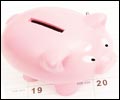
Now Or Later?
By on Apr 25, 2008

By Marcia Luke
Finances aren't something that everyone readily understands, but having a financial strategy is a necessity for a new homeowner. When money is tight, you have to be careful with every penny. You also want to think about how you can get ahead. Where should your extra pennies go? What is the best strategy, and how does it change as you get older?perhaps you should upgrade into a bigger home or have a family?
Some might say that paying down existing debt is most important, so you should add additional money onto your mortgage every year to pay it faster. Others will tell you that if you wait until your debt is paid to invest in an RRSP, you'll be in sorry shape come retirement. When it comes right down to the numbers, which route will keep more money in your bank account?
Mark D'Souza, financial planner at Dundee Private Investors, says that people have a tendency to take the maximum amount of mortgage that a bank will give them. "This doesn't lend for great planning if something happens." D'Souza helps people to balance their mortgage payments with financial protection in the form of insurance for disability, job loss, and other unexpected and unwelcome situations. He says that it's important to see a planner or agent to customize the right insurance package for you. What you're being offered at work or at your bank via your mortgage might not be enough. "Homeowners need to make sure that they have adequate savings and insurance to handle emergencies," says D'Souza, and then the financial focus should be on
paying down debt. "It's more prudent to pay down your debt now to gain more flexibility later."First-time new homeowners Stephanie Noble and Tyson Peel recently purchased a townhome in Bowmanville. "We put our down payment on the house and then we saved until we moved in, which was the biggest benefit of buying new." Noble is a kindergarten teacher, and while her employer provides a pension plan which is automatically deducted from her paycheque, Peel does not have the same option. He is an underwriter for a commercial insurance company, and instead he makes regular contributions to an RRSP. They make their mortgage payments on a monthly basis.
"We keep it minimal what we invest so that we can also anticipate extra costs, like putting up a fence or paving the driveway. When we put money into our account, we try to build a surplus," says Noble. Since they're only in the first year of home ownership, she's unsure whether they'll even be in a position to put more money toward their mortgage. Instead they're sticking to their mortgage payments and looking to the future as well. "We're just trying to put a little bit everywhere. It's even about being able to entertain once in awhile. Every single thing that you do is calculated somewhat."
Howard Kabot, national director of financial planning at Scotia Bank, recommends really sitting down and crunching the numbers to determine what your strategy should be. "What we do tend to talk about is speaking to both strategies, directing some funds towards your RRSP and paying down debt. I think sometimes we can be a little too focused on paying down debt from a purely financial perspective. Can you spread yourself too thin? Yes you can, but if you"re cautious then it's very responsible," Kabot says regarding Noble and Peel's strategy. Kabot says that if RRSPs are a major part of your retirement plan, then max out your investment each year and use your tax refund to pay down your debt, working on the highest interest rates first, like credit cards. "People should never carry debt on credit cards," says Kabot, advising instead to transfer that debt to a personal line of credit with a lower interest rate.
Kabot explains that you have to compare the interest rate you're paying on your debt with the interest gained on an investment while at the same time taking into account that RRSPs afford you a tax break. Is it really worth it to focus on one or the other? It can be beneficial to seek the help of a financial advisor when you start crunching, but what it boils down to is different for every individual's situation. "There needs to be a balance, though there's something to be said about enjoying life. A house is an investment, but it's also a quality of life decision," says Kabot.
Getting an early start on a retirement fund is important, but obviously the less interest you pay on your mortgage, the further ahead you'll be in the long run. Because our priorities and financial obligations change so frequently, it's also necessary to change your overall plan, sometimes on an annual basis. Decide what it is you want to change financially and make a list to compare the dollars and cents involved in each factor. You also need to set a predetermined amount of time for your analysis. Once you've put it all down on paper, your financial plan should be much easier to recognize.
Pros and Cons
Let's suppose that you're a new homeowner around the age of 30. You're not worrying about retirement yet, but it's a consideration. Your mortgage term is 15 years. You'll have your mortgage paid by the time you're 45, at which time you can focus more steadily on retirement. The chart below will give you a starting point, but keep in mind that the closer you get to retirement, the more important your RRSP becomes and hopefully the closer you'll be to paying off your mortgage entirely. Compare how much money you'll be "saving" for each in a year's time and take it from there!
Mortgage
5 per cent interest
$200,000 principal ($20,000 down payment)
after tax $
time remaining: 15 years
RRSP
5 per cent interest
currently building on $10,00
tax-free $
time remaining: 30 Years


